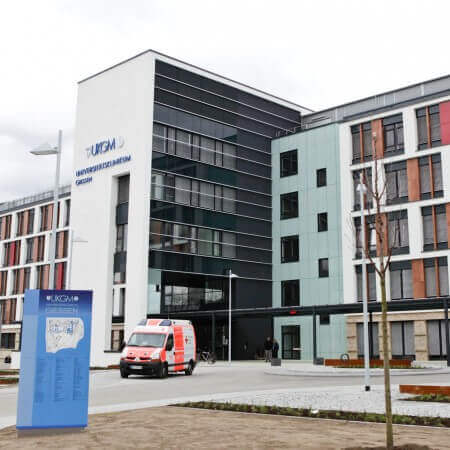Shoulder arthritis is a chronic degenerative disease caused by the destruction of cartilage, bone tissue of the scapula, and humerus. The disease is manifested by chronic pain and limited mobility of the upper extremities. Pain suppressants and other conservative therapies are used for the treatment of early stages. If they no longer work, doctors switch to surgical treatment: they perform arthroscopic operations, and, in the case of severe arthritis, resort to joint replacement surgery.
Content
- What is shoulder arthritis?
- Diagnostics
- Conservative therapy
- Arthroscopic surgery
- Shoulder replacement surgery
- Why is it worth undergoing arthritis treatment in Germany?
What is shoulder arthritis?
Shoulder arthritis usually does not develop without obvious causes, unlike arthritis of the joints of the lower extremities. The arm joint, despite its high mobility, does not wear out with years, since it does not have to support the weight of the human body. Shoulder arthritis occurs much less frequently than coxarthrosis and gonarthrosis. Conservative methods or joint replacement surgery are often sufficient for the treatment. Sometimes doctors have to resort to joint replacement surgery.
Shoulder arthritis can be primary and secondary. The primary one develops as an independent disease, and the secondary one complicates other pathologies.
According to the causes of development, primary shoulder arthritis can be:
- micro traumatic – the most common type of the disease; it is the result of recurrent microtraumas in athletes or patients engaged in physical labor;
- involutional – the result of age-related cartilage tissue degeneration and it is very rare.
Secondary shoulder arthritis can be:
- post-traumatic – after sports or other injuries;
- post-infectious – after infectious arthritis;
- shoulder arthritis is caused by diffuse connective tissue diseases – a consequence of autoimmune inflammation of the shoulder joint;
- arthritis as the advanced stage of humeral head osteochondropathy;
- shoulder arthritis due to long-term instability, which is usually associated with common shoulder dislocation.
Diagnostics
The main complaint of patients is a pain in the shoulder joint.
The diagnosis is confirmed using instrumental diagnostic methods. The simplest option is X-ray scanning. The signs of severe arthritis can be easily seen on X-ray images. The doctor detects calcifications (salt deposits), osteophytes (bone growths), and cysts in the bone tissue under the cartilage. Bone mineralization is usually impaired, and fluid is found inside the joint due to reactive inflammation of the synovial membrane.
Doctors in Germany use CT, and MRI scans to diagnose arthritis. These methods are more accurate. They allow the detection of arthritis even at the early stages with an accuracy of 95%.
Conservative therapy
The conservative treatment goal is to eliminate pain, improve shoulder mobility, increase the patient's ability to work, and ensure a high quality of life. Further degenerative and dystrophic changes in the shoulder are prevented, if possible.
Modern medicine has the following means for dealing with arthritis:
- painkillers and anti-inflammatory drugs;
- bandages that limit unwanted movements;
- functional rest (refusal of physical labor if repetitive movements in the shoulder joint lead to its microtrauma);
- drug-free methods of pain management: massage, physiotherapy, kinesio taping, acupuncture, shock wave therapy;
- therapeutic exercises;
- intra-articular injections.
Temporary improvement can be obtained by blocking the shoulder with local anesthetics and glucocorticoids. Pain and other symptoms may decrease for several weeks. However, it is often impossible to repeat injections, because due to glucocorticoids, degenerative changes in cartilage progress faster, which only brings joint replacement surgery closer.
Doctors from countries with advanced medicine have in their arsenal painkillers, blocks, and also cell therapy, which allows them to accelerate the regeneration of articular cartilage. Doctors perform injections into the joint. They inject platelet-rich plasma or stem cells from adipose tissue. Platelet-rich plasma secretes growth factors that stimulate recovery processes. Stem cells not only accelerate tissue regeneration but also mature into cartilage cells by themselves and integrate into the defect area.
Arthroscopic surgery
Arthroscopy for shoulder arthritis is more successful than for lesions of the lower extremity joints. It is because the results achieved are usually preserved for a long time or forever because the disease rarely progresses.
Arthroscopy is a minimally invasive intervention on the joint. The doctor inserts thin, long instruments and a mini video camera through short incisions into the shoulder. He can remove cartilaginous loose bodies, polish the articular cartilage, and remove the inflamed synovial membrane.
The operation is significantly less traumatic as compared to conventional open surgical interventions. In just a few weeks, patients recover and can return to normal life, without pain and functional limitations.
Shoulder replacement surgery
If other methods do not work or the doctor considers them unpromising due to severe arthritis, they resort to joint replacement surgery. The person's shoulder joint is removed and replaced with an artificial one.
Shoulder replacement surgery is no less successful than knee or hip replacement surgery. When performed by professionals, they are effective in almost all patients, and artificial joints can serve for decades without requiring replacement.
The operation has the following contraindications:
- active inflammation of the shoulder joint;
- brachial plexus paralysis with loss of function of the muscles of the rotator cuff and deltoid muscle;
- patient's general severe condition, chronic decompensated diseases;
- complete shoulder instability.
The shoulder joint contains two components: the spherical humeral head and the flat articular surface of the scapula. They contact minimally, and movements are weakly limited by bone structures. The shoulder stability is largely provided by the tendons of the rotator cuff muscles.
When performing joint replacement surgery, the doctor can replace one or two components of the endoprosthesis at once:
Shoulder hemiarthroplasty is an operation to replace only the shoulder component. This surgical intervention is less traumatic, provides quick recovery for patients, and the ability to return to sports activities in a short time, with minimal risk of complications. Even with high sports loads, the implanted endoprosthesis wears out very slowly. The cost of treatment is lower, and the prosthesis is cheaper. However, there are disadvantages: the functional outcomes are worse; there is a risk of pain persisting, and, besides, the method is not suitable for all patients but is used only in the absence of degenerative changes on the articular surface of the scapula. Pain returns in approximately 8% of patients due to the appearance of erosion on the glenoid fossa of the scapula.
Total shoulder replacement is an operation to replace the brachial and scapular components. This surgical intervention is performed twice as often. It provides the best functional results by giving the patient a maximum range of motion in the shoulder. The pain syndrome is completely absent. Total shoulder replacement surgery allows doctors to cope with even the most severe cases of shoulder arthritis. However, there are disadvantages: the operation is more traumatic; it takes longer to recover from it, and the prosthesis wears out faster.
In turn, total shoulder replacement can be:
In 90% of cases, doctors perform anatomic shoulder replacement surgery. It means that during the surgery they implant an artificial joint that is as similar as possible in anatomical structure to the patient's own shoulder joint. The artificial head of the shoulder looks like a ball, and the scapular part has a flat articular surface.
In 10% of cases, reverse joint replacement surgery is performed. In this case, the opposite occurs: the shoulder has a flat surface, and the scapula is spherical. It is necessary for a concomitant irreparable rupture of the tendons of the rotator cuff muscles of the shoulder. These muscles provide rotation of the arm in the shoulder joint. If they do not work, then the function of rotation must be taken over by the deltoid muscle. For this purpose, reverse shoulder replacement surgery is performed.
However, many tendon ruptures, even if they are degenerative can be repaired. In such cases, German surgeons simultaneously perform anatomic joint replacement surgery and muscle and tendon plastic surgery to restore the function of the rotator cuff and improve shoulder mobility.
Depending on the number of operations performed, joint replacement surgery can be primary or revision. If you get treatment in Germany, then the likelihood of a need for the second (revision) intervention is low. The cause is usually loosening of the endoprosthesis or infectious complications. The risk of loosening is higher with high sports loads, as well as with the use of poor-quality prostheses and errors in implantation.
Why is it worth undergoing arthritis treatment in Germany?
Germany offers many top-class clinics specializing in sports medicine, orthopedics, and traumatology. Here you will be relieved of chronic pain and fully restore the function of the shoulder. After treatment, you can return to physical labor or sports training again.
Here are some reasons for you to undergo treatment in Germany:
- the latest methods of conservative therapy, including cell therapy, which stimulates cartilage tissue regeneration;
- arthroscopic operations for the treatment of arthritis: minimally traumatic, through short incisions, with rapid recovery;
- various options for joint replacement surgery in severe arthritis, which allow the patient to fully restore joint function even in the most severe cases, get rid of pain, and return to normal life;
- low risk of complications during and after surgery;
- comprehensive care and well-performed pain management;
- comprehensive orthopedic rehabilitation.
To undergo treatment for shoulder arthritis in Germany, please use the Booking Health service. On our website, you can get up-to-date and accurate information about the cost of treatment in Germany, compare prices in different German hospitals and book a medical care program at a favorable price. The treatment will be easier and faster for you, and the cost of treatment in Germany will be lower.
You are welcome to leave your request on the Booking Health website. Our employee will contact you, consult, and answer all questions. We will take care of the organization of your trip abroad. We will provide the following benefits to you:
- We will select the best German hospital whose doctors specialize in shoulder replacement surgery and achieve the best results.
- We will help you overcome the language barrier and establish communication with the doctor in the German hospital.
- We will reduce the waiting period, and you will receive medical care on the most suitable dates.
- We will reduce the price. The cost of treatment in Germany will be lower than usual due to the lack of overpricing and coefficients for foreign patients.
- Our specialists will solve any organizational issues: paperwork, transfer from the airport to the German hospital and back, hotel booking, and interpreting services.
- We will prepare medical documents and translate them into English or German. You do not have to repeat previously performed diagnostic procedures.
- We will keep in contact with the German hospital after the completion of treatment.
- We will arrange additional diagnostics and treatment if necessary.
- We will buy medicines in another country and forward them to your native country.
While the best specialists in the world take care of your health, the Booking Health staff will help reduce the cost of treatment in Germany and take care of all your travel arrangements.
Authors:
The article was edited by medical experts, board certified doctors Dr. Nadezhda Ivanisova and Dr. Sergey Pashchenko. For the treatment of the conditions referred to in the article, you must consult a doctor; the information in the article is not intended for self-medication!
Sources:
MedlinePlus
Medscape
Cochrane Rehabilitation














